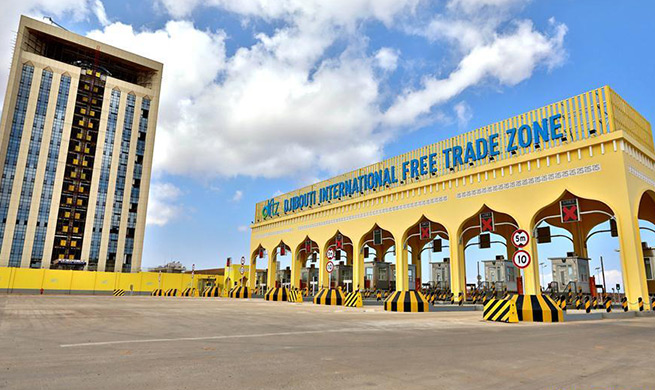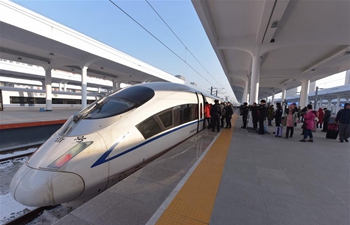BEIJING, Dec. 27 (Xinhua) -- China on Thursday announced that the primary system of BeiDou-3 has been established and started to provide global services, meaning its home-grown BeiDou Navigation Satellite System (BDS) officially went global.
The BDS has been performing well in the Asia-Pacific region and it goes global with cutting-edge technology and high-quality service.
"The BDS is very popular in Indonesia," said Marianto Yang, an agent selling satellite navigation equipment in Indonesia, adding that the system offers services superior to similar equipment.
In November 2017, BeiDou-3, the latest generation of the BDS, started its satellite constellation, which was completed this November.
Xie Jun, deputy chief designer of the system, said the goal of the design of BeiDou-3 is to provide services with comparable accuracy to those of the third generation of the Global Positioning System owned by the United States and European Galileo system.
The new progress of BeiDou-3 offers an alternative to the world.
"We have seen great potential in the BeiDou system," said Sabira Khatun, a professor who specializes in electronics engineering at Universiti Malaysia Pahang, emphasizing that the system has brought opportunities for academic cooperation on navigation between the two countries.
The BDS was created in a spirit of openness and cooperation. Before BeiDou-3 started its global service, services provided by BeiDou-2 had been applied in over 70 countries and regions, from land planning and supervision of river transport in Myanmar to urban modernization and smart tourism in Brunei.
In recent years, the BDS's pace of globalization has been quickening. At the sixth ministerial meeting of the China-Arab States Cooperation Forum in 2014, the application of the BDS in Arab countries has been discussed.
In May 2015, China and Russia signed the BeiDou-Glonass system compatibility and interoperability cooperation agreement. In April 2018, the China-Arab States BDS/GNSS Center, the first overseas center for China's indigenous BDS, was officially inaugurated in Tunisia.
"Cooperation on the BDS is of special significance for the Belt and Road construction," said Mohamed Ben Amor, secretary general of the Tunisia-based Arab Information and Communication Technology Organization, an Arab governmental organization under the Arab League.
"The next step of the China-Arab cooperation is to achieve further connectivity and both sides can apply the BDS to promote regional technological and economic development," Amor added.
Shen Jun, deputy director of the International Cooperation Center of the China Satellite Navigation Office, said the China-Russia Commission on Important Strategic Satellite Navigation Cooperation has been established to continuously coordinate and promote bilateral cooperation in satellite navigation.
Cooperative projects between China and Russia include the development of chips for satellite navigation applications and autonomous vehicles in agriculture, Shen added.
This year has seen an intensive launch of BeiDou satellites. By around 2020, when the BeiDou system completes its global network, it will have more than 30 satellites.
All countries around the world, especially developing ones, will enjoy free positioning and navigation services provided by the BDS, which "not only is the progress of the global satellite navigation system, but also benefits the development of production and transportation in these countries," said Amor.
(Xinhua reporters Yang Jun in Beijing, Liang Hui in Jakarta, Lin Hao in Kuala Lumpur, Ma Di and Huang Ling in Tunis, and Luan Hai in Moscow also contributed to the story.)

















